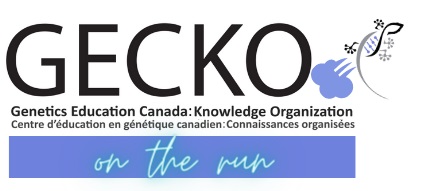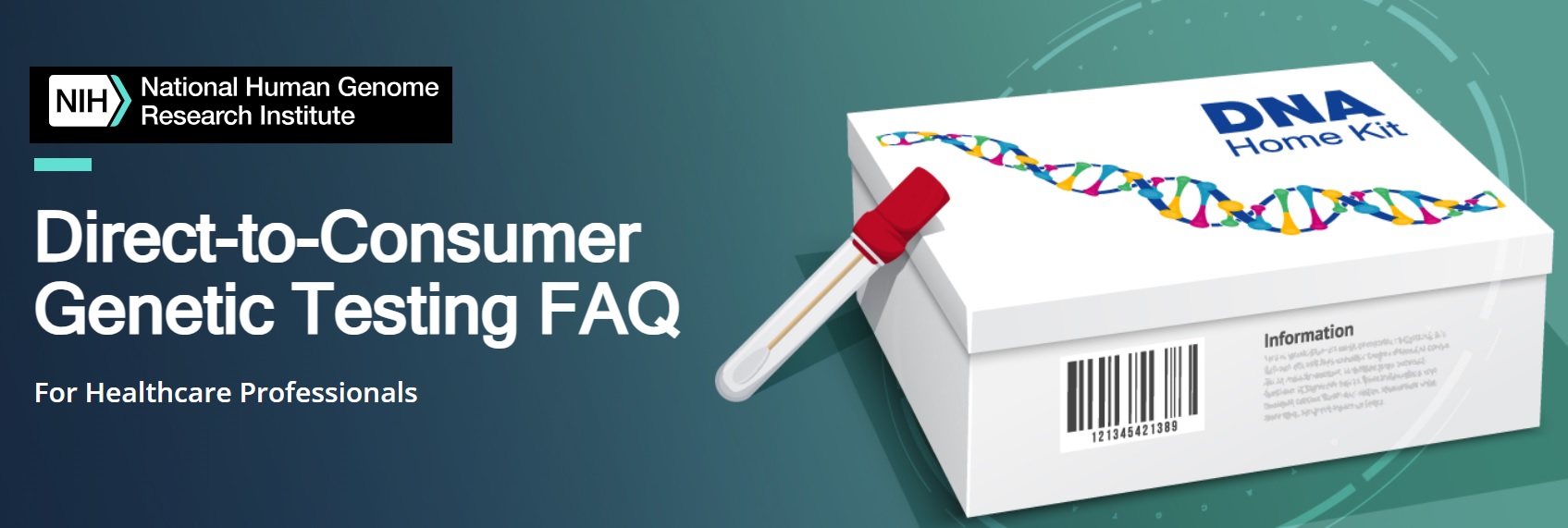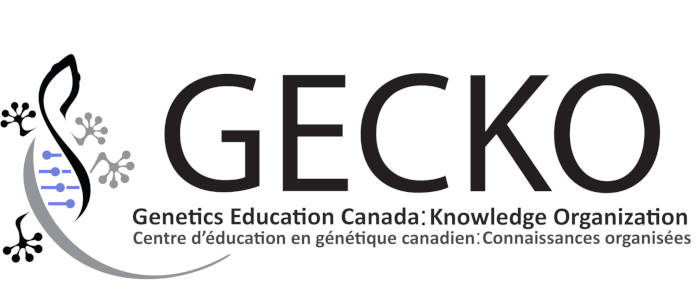
Download the PDF here. Access an education module on DTC with case-based learning here.
Updated April 2023
Bottom line: Direct-to-consumer genomic testing (DTC-GT) is over-the-counter genomic testing available online to consumers through private companies. Generally, results report an individual’s risk to develop a medical condition as being below average/low, average/general population, and above average/high based on genome wide association studies (GWAS). Results may provide medically useful information for consumers and potentially provide support and motivation for lifestyle changes (e.g. weight loss, smoking cessation) or even more vigilant surveillance (e.g. breast cancer screening), reveal carrier status of single gene conditions (e.g. cystic fibrosis), effectiveness and side-effect risk of certain medications, in addition to medically irrelevant information (e.g. curly hair). Currently, DTC-GT is not regulated or accountable to an appropriate governing body. Numerous professional societies express concern about how DTC-GT is marketed to consumers, what and how information is provided and the lack of genetic counselling. Family health history-based risk assessment is still the gold standard in initial assessment for heritable conditions.
 Also check this out --> The Direct-to-Consumer Genetic Testing (DTC-GT) Project Group of the Inter-Society Coordinating Committee for Practitioner Education in Genomics has created a DTC-GT Frequently Asked Questions (FAQ) resource designed for the general clinician who may see patients requesting guidance on DTC-GT. This FAQ is intended to help healthcare professionals understand the diverse landscape of DTC-GT, the benefits and limitations of these tests and how results of DTC-GT may affect their patients’ health, wellness and medical decision making.
Also check this out --> The Direct-to-Consumer Genetic Testing (DTC-GT) Project Group of the Inter-Society Coordinating Committee for Practitioner Education in Genomics has created a DTC-GT Frequently Asked Questions (FAQ) resource designed for the general clinician who may see patients requesting guidance on DTC-GT. This FAQ is intended to help healthcare professionals understand the diverse landscape of DTC-GT, the benefits and limitations of these tests and how results of DTC-GT may affect their patients’ health, wellness and medical decision making.
WHAT IS DIRECT –TO-CONSUMER GENOMIC TESTING?1,2
Direct-to-consumer genomic testing (DTC-GT), also referred to as personal genome testing, refers to genomic testing available for over-the-counter purchase without the requirement of health care practitioner involvement. Generally, DTC-GT is marketed with the promise of providing predictive genomic risk assessment for a variety of complex health conditions (e.g. diabetes, cancer, obesity) and information regarding response to and/or side-effect risk of certain medications (e.g. clopidogrel, statins). Additionally, DTC-GT is advertised to assist in diet and exercise planning and can uncover medically irrelevant information such as bitter taste perception or curly hair.
Generally, DTC-GT is available online to anyone for a cost. Genomic testing for DTC-GT is usually performed on a saliva sample.
WHAT DO THE GENOMIC TEST RESULTS MEAN?
Test results for DTC-GT depend on what condition is being tested and what technology is being used. See our resources on Genomic Test Results for more information.
Appropriate pre- and post-test counselling are rarely offered directly by the DTC-GT company or inconsistently accessed by consumers when available3-6. Ideally, it should be carried out so that the consumer is informed of what the results might reveal (e.g. risk of multifactorial conditions that arise due to the combined contribution of genetic and environmental factors, carrier status of single gene conditions, including cancer predisposition syndromes) and the potential for results requiring additional medical follow-up not limited to behavioural modifications (e.g. vigilant breast screening and discussion of risk reducing surgery as a result of a BRCA gene mutation). The implications for extended family members should be addressed. Genetic counselling would also include the limitations of the test offered as well as incorporate additional personal health and family history information into risk assessment and test interpretation.
Multifactorial disorders and genome-wide association studies (GWAS): GWAS are case-control studies which examine many common variations in our genetic code (single nucleotide polymorphisms [SNPs]). They compare large groups of individuals (unaffected controls versus individuals with symptoms of a specific disease or those experiencing a particular medication response) in an attempt to distinguish between non-harmful changes in the DNA code and pathogenic, disease causing/predisposing changes. SNPs (pronounced ‘snips’) are the most common type of genetic variation. Each SNP represents a difference in a single DNA building block, a nucleotide. SNPs occur normally in an individual’s genome about once in every 300 nucleotides, thus there are about 10 million SNPs in the human genome.
Odds ratios and relative risks are used to categorize an individual as at increased risk (higher than average), average (general population risk), or at decreased risk (lower than average). Results from GWAS may be used to report on an individual’s risk for cancer, heart disease or diabetes.
Mendelian disorders and ethnicity-specific testing or next generation sequencing: Single gene disorders (e.g. cystic fibrosis, HFE-associated hemochromatosis, BRCA-associated hereditary breast and ovarian cancer syndrome) are often screened for by targeting only ethnicity-based gene variations. For example, screening for pathogenic variants* in the BRCA1 and BRCA2 genes are limited to the three commonly found in individuals of Ashkenazi Jewish ethnicity, regardless of the consumer’s reported ethnicity. In these cases not all clinically relevant mutations or even genes are necessarily included in analysis; possibly resulting in false reassurance with negative results7.This is of particular importance where there is a known family history.
Additionally next generation sequencing (NGS) may be employed where the entire coding region of a gene is sequenced looking for significant variation as compared to a reference sequence. While some variations are well known to be either pathogenic or benign, some require specialized analysis by a genomic specialist. Genetic changes that are only weakly associated with disease may be reported, possibly leading to anxiety or inappropriate additional testing7. Additionally, due to variability in interpretation, there is the possibility of conflicting risk interpretations between companies.
*pathogenic variant: a change in a gene that disrupts proper function and increases susceptibility to or causes a disease or condition. Formerly called mutation.
Pharmacogenomics: The goal of pharmacogenomics is to identify gene-drug interactions to improve the safety and efficacy of medications8. The clinical utility of pharmacogenomics is still be established but looks promising.9 As of writing, few DTC-GT companies offer pharmacogenomics as part of their testing menu. Most often, privately available pharmacogenomic testing requires health care provider involvement8. Like genomic testing for Mendelian disorders, pharmacogenomics testing is highly dependent upon ethnicity-based gene variations8. Most often companies are analysing for specific SNPs enzyme genes key to specific drug/drug class metabolism e.g. CYP2D6 and codeine metabolism10. Drug and/or dosage response are then predicted. International guidelines have been published and are often referred to on reports11,12.
WHAT ARE THE BENEFITS OF DIRECT-TO-CONSUMER GENOMIC TESTING?
While there are limited data to support the clinical validity (ability to predict clinical outcome) and utility (the likelihood of improving patient outcome), some consumers might benefit from DTC-GT as results may:
- Encourage positive behaviour modifications (e.g. increase exercise, smoking cessation), although data is conflicting as to whether or not this is true12, 13
- Provide useful information for medication choice or management
- Provide information to individuals who have no or limited information about their family history (e.g. an individual who was adopted)
- Reveal carrier status of a genetic condition that could have implications for family planningg. cystic fibrosis, sickle cell anemia
- Reveal increased risk of adult-onset disorder with published screening and surveillance guidelines e.g. alpha-1 antitrypsin deficiency, BRCA-associated hereditary breast and ovarian cancer
WHAT ARE THE LIMITATIONS AND RISKS OF DIRECT-TO-CONSUMER GENOMIC TESTING?
Caution when interpreting DTC-GT should be exercised as:
- DTC-GT does not take into account numerous factors important when interpreting genetic test results such as age, family history, lifestyle (e.g. smoking, obesity) and other environmental factors that are a significant contribution to common complex disease development14, 15
- Family health history-based risk assessment is still the gold standard in the initial assessment for heritable conditions16
Another concern associated with DTC-GT is the unknown impact of privately obtained testing on a publicly funded health care system1,17. There are limited prospective studies with actual DTC-GT consumers and longitudinal follow-up that assess health care utilization1,12,13,18. While the medical system may be called upon to use limited resources to dismiss incorrectly assigned increased disease risk17, referral to a specialist or confirmation of test results in a clinical laboratory may be indicated in some circumstances to clarify appropriate surveillance and management.
Additionally, “misattributed equivalence” is a great concern associated with personalised genome testing. There is a fear that if a DTC-GT test were to indicate a lower-than-average lifetime risk for a certain condition, when family history indicated a much higher risk, a consumer could be falsely reassured and not be as vigilant about medical interventions indicated by family history. This phenomenon speaks to the need for knowledgeable health care provider involvement in pre- and post-test counselling.16
Some DTC-GT companies will offer access to genetic counselling included with testing or for an added cost. In Canada, genetic counselling is an unregulated profession. To ensure the genetic counsellor providing services to you and your patient has demonstrated a standard level of knowledge, skills, and practice competencies look for appropriate credentials from the Canadian Board Genetic Counselling (CCGC, Canadian Certified Genetic Counsellor/CGAC, Conseiller(ère) en génétique agréé(e) du Canada), or from the American Board of Genetic Counseling (CGC, Certified Genetic Counselor).
WHAT SHOULD I KNOW ABOUT DIRECT-TO-CONSUMER GENOMIC TESTING AND REGULATION?
Numerous health professional organizations and public bodies have published positions statements, policies, and guidelines on DTC-GT. There is variability between publications, however overall there is strong support for: genetic testing laboratories and personnel being accredited/certified by appropriate governing bodies (e.g. Clinical Laboratory Improvement Amendments (CLIA) certification or appropriate provincial licensure bodies for laboratories, board-certification of genetic counsellors and geneticists); pre- and post-test genetic counselling by qualified a health professional to include limitations of testing, for fully informed consent by the consumer.17,19-21
Additionally, privacy is a major concern. DTC-GT companies have self-imposed policies that claim a consumer’s genomic information will not be shared, although there is no regulation to dictate what happens if/when a company is sold or goes out of business2. One study has shown that with the release of even a few genomic markers, they were able to, with high probability; identify multiple participants in public sequencing projects using a technique that entirely relied on free, publicly available resources with only computational tools and an Internet connection. The researchers further demonstrated that this method could lead to the identification of another person who might have no acquaintance with the person who released his/her genomic data22.
Since the launch of DTC-GT companies in Canada, there have yet to be any regulatory guidelines. Health Canada states that the agency regulates only the safety of the collection kit and not how information from genetic tests is used, further noting that medical information and privacy issues are a provincial responsibility. In Canada diagnostic laboratories are provincially regulated. At the time of writing, no DTC-GT is operating under approved provincial regulation, although some may meet USA federal standards (e.g. CLIA). Companies that are not regulated could have staff performance, test analysis and interpretation of results that may not be certified or licenced by any appropriate governing body.
A recent systematic review by Martins et al. found that while knowledge and experience with DTC-GT has increased over the last two decades, ethical and legal concerns persist.23
INSURANCE AND CANADA’S GENETIC NON-DISCRIMINATION ACT (GNA)
There is protection for Canadians under the Genetic Non-Discrimination Act (GNA) passed in May 2017. Some key points of the law are that -
GNA prohibits:
- Discrimination based on genomic characteristics
- Providers of goods and services (including insurance) from:
- requesting or requiring a genomic test
- requesting or requiring the disclosure of genomic test results either past or future
- Federally regulated employers from using genomic test results in decisions about hiring, firing, job assignments, or promotions
Note that many insurance companies do ask about conditions and diseases in relatives, and individuals may need to disclose a medical diagnosis (not genomic test results) as family history is not protected e.g. cancer or Huntington disease. A recent commentary in Canadian Family Physician discusses GNA and the implications for healthcare.24
AUTHORS: S Morrison MS CGC, JE Allanson MD FRCPC and JC Carroll MD CCFP
REFERENCES
- Scott Roberts, J and Jenny Ostergren, J. Direct-to-Consumer genetic testing and personal genomics services: a review of recent empirical studies. Curr Genet Med Rep. 2013; 1(3): 182–200
- Su P. Direct-to-consumer genetic testing: a comprehensive view. Yale J Biol Med 2013;n86(3):359-65
- Bloss CS, Wineinger NE, Darst BF, et al. Impact of direct-to-consumer genomic testing at long term follow-up. J Med Genet 2013; 50(6):393-400
- [No authors listed]. Few direct-to-consumer test users receive genetic counseling: More consumers discuss results with primary care physicians. Am J Med Genet A 2017;173(9):2304-2305
- Koeller DR, Uhlmann WR, Carere DA, et al. Utilization of Genetic Counseling after Direct-to-Consumer Genetic Testing: Findings from the Impact of Personal Genomics (PGen) Study. J Genet Couns 2017;[Epub ahead of print]
- Kaufman DJ, Bollinger JM, Dvoskin RL, et al. Risky business: risk perception and the use of medical services among customers of DTC personal genetic testing. J Genet Couns 2012;21(3):413-22
- Goh E, Guerin A, Lazier J, et al. Choosing Wisely Canada: The Canadian College of Medical Geneticists' (CCMG) list of five items physicians and patients should question. J Med Genet 2017;[Epub ahead of print]
- Filipski KK, Murphy JD, Helzlsouer KJ1. Updating the landscape of direct-to-consumer pharmacogenomic testing. Pharmgenomics Pers Med 2017;10:229-232
- Gibbons C, Allanson, JE, Morrison S, Carroll, JC. Pharmacogenomics: codeine and breastfeeding. 2014 Jan. In: GECKO on the run [Internet]. Ottawa (ON): Genetics Education Canada: Knowledge Organization. 2011-2023. Available from: https://www.geneticseducation.ca
- Swen JJ, van der Wouden CH, Manson LE, et al; Ubiquitous Pharmacogenomics Consortium. A 12-gene pharmacogenetic panel to prevent adverse drug reactions: an open-label, multicentre, controlled, cluster-randomised crossover implementation study. Lancet. 2023 Feb 4;401(10374):347-356
- Bank PC, Caudle KE, Swen JJ, et al. Comparison of the Guidelines of the Clinical Pharmacogenetics Implementation Consortium and the Dutch Pharmacogenetics Working Group. Clin Pharmacol Ther. 2017;[Epub ahead of print]
- Whirl-Carrillo M, Huddart R, Gong L, et al. "An evidence-based framework for evaluating pharmacogenomics knowledge for personalized medicine"Clinical Pharmacology & Therapeutics (2021) online ahead of print.
- Stewart KFJ, Wesselius A, Schreurs MAC, et al. Behavioural changes, sharing behaviour and psychological responses after receiving direct-to-consumer genetic test results: a systematic review and meta-analysis. J Community Genet 2017;[Epub ahead of print]
- Hollands GJ, French DP, Griffin SJ, et al. The impact of communicating genetic risks of disease on risk-reducing health behaviour: systematic review with meta-analysis. BMJ 2016;352:i1102
- Heald B, Edelman E, Eng C. Prospective comparison of family medical history with personal genome screening for risk assessment of common cancers. Eur J Hum Genet 2012; 20(5):547-51
- Burke W, Trinidad SB. The deceptive appeal of direct-to-consumer genetics. Ann Intern Med 2016;164(8):564-5
- Aiyar L, Shuman C, Hayeems R et al. Risk estimates for complex disorders: comparing personal genome testing and family history. Genet Med2014; 16(3):231-7
- CCMG Ethics and Public Policy Committee, Nelson TN, Armstrong L, et al. CCMG statement on direct-to-consumer genetic testing. Clin Genet 2012;81(1):1-3
- Hoang N, Hayeems R, Davies J, Pu S, et al. Does personal genome testing drive service utilization in an adult preventive medicine clinic? J Community Genet 2017;8(3):151-158
- Skirton H, Goldsmith L, Jackson L, O'Connor A. Direct to consumer genetic testing: a systematic review of position statements, policies and recommendations. Clin Genet 2012m82(3):210-8
- ACMG Board of Directors. Direct-to-consumer genetic testing: a revised position statement of the American College of Medical Genetics and Genomics. Genet Med 2016;18(2):207-8
- Gymrek M, McGuire AL, Golan D, et al. Identifying personal genomes by surname inference. Science 2013; 339(6117):321-4
- Martins MF, Murry LT, Telford L, Moriarty F. Direct-to-consumer genetic testing: an updated systematic review of healthcare professionals' knowledge and views, and ethical and legal concerns. Eur J Hum Genet. 2022 Dec;30(12):1331-1343
- Cowan JS, Kagedan BL, Graham GE, et al. Health care implications of the Genetic Non-Discrimination Act: Protection for Canadians' genetic information. Can Fam Physician. 2022;68(9):643-646.
Disclaimer:
· GECKO is an independent not-for-profit program that does not accept support from commercial or non-academic entities.
· GECKO aims to aid the practicing non-genetics clinician by providing informed resources regarding genetic/genomic conditions, services and technologies that have been developed in a rigorous and evidence-based manner with periodic updating. The content on the GECKO site is for educational purposes only. No resource should be used as a substitute for clinical judgement. GECKO assumes no responsibility or liability resulting from the use of information contained herein.
· All clinicians using this site are encouraged to consult local genetics clinics, medical geneticists, or specialists for clarification of questions that arise relating to specific patient problems.
· All patients should seek the advice of their own physician or other qualified clinician regarding any medical questions or conditions.
· External links are selected and reviewed at the time a page is published. However, GECKO is not responsible for the content of external websites. The inclusion of a link to an external website from GECKO should not be understood to be an endorsement of that website or the site’s owners (or their products/services).
· We strive to provide accurate, timely, unbiased, and up-to-date information on this site, and make every attempt to ensure the integrity of the site. However, it is possible that the information contained here may contain inaccuracies or errors for which neither GECKO nor its funding agencies assume responsibility.


